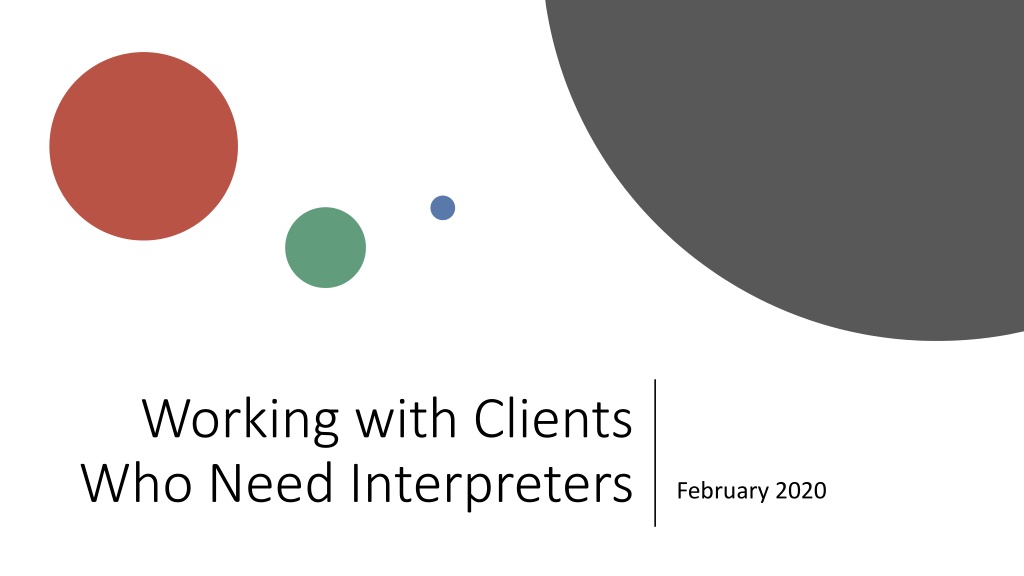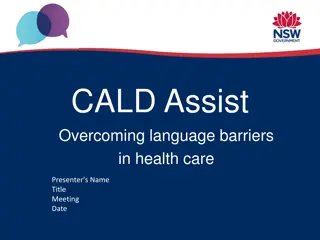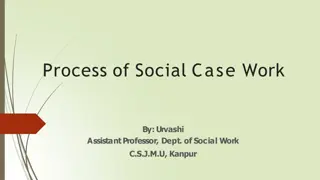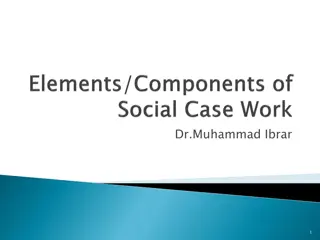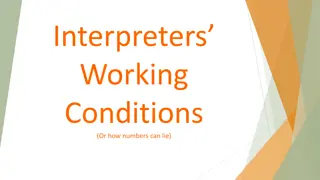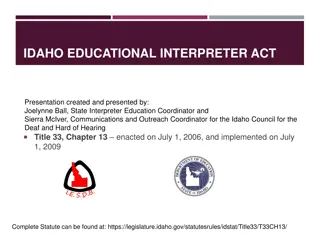Essential Guide to Working with Interpreters for Client Communication
Understanding the need for interpreters, recognizing ethical issues, developing skills, and distinguishing between interpreting and translation are crucial aspects when working with clients who require language support. It's essential to know when to request an interpreter and the legal obligations regarding language access to ensure effective communication and avoid discrimination.
Download Presentation

Please find below an Image/Link to download the presentation.
The content on the website is provided AS IS for your information and personal use only. It may not be sold, licensed, or shared on other websites without obtaining consent from the author. Download presentation by click this link. If you encounter any issues during the download, it is possible that the publisher has removed the file from their server.
E N D
Presentation Transcript
Working with Clients Who Need Interpreters February 2020
Identify when you need to obtain an interpreter for a client Identify Develop Develop skills for working with interpreters Objectives Recognize potential ethical issues that may arise when working with interpreters Recognize Discuss Discuss case examples
Interpreting vs. Translation Translator translates written text Translators need to have the ability to understand the source language and the culture of the country where the text originated and are able to use reference materials to carefully translate documents from one language to another. EBS client services agreement has been translated into Spanish, for example.
Interpreting vs. Translation (cont.) Interpreter interprets spoken words Interpreters have to be able to translate in both directions, on the spot, with limited use of reference materials Sign language interpreters do the same but spoken word <> sign language
When to Request an Interpreter Conversational fluency in any language is vastly different from the process of professional interpreting. Short, simple conversations might be okay to use a family member or pass a notebook back and forth Long, complex conversation qualified interpreter may be required Spoken communication takes place at a rate of 125 to 230 words per minute, professional interpreters are trained to deliver a smooth, accurate and impartial interpretation, while a person who is merely fluent in any language is not.
When to Request an Interpreter (cont.) Most importantly, when the person asks for an interpreter, we must provide one Title VI of the Civil Rights Act of 1964 - protects people from discrimination based on race, color or national origin The Americans with Disabilities Act (ADA) & The Rehabilitation Act of 1973 - recognizes the civil rights of people who are deaf and hard of hearing Contract with DHS & Aging Units etc.
Aging Network Manual Chapter 7.6.1 Equal Opportunity in Service Delivery When a particular program or service is not accessible because of physical or program barriers, the service provider will make arrangements to use alternate accessible facilities or to remove the program barrier (such as arranging for an interpreter in a timely fashion or altering the service to meet the needs of the participant. Chapter 9.9.1 Responsibilities of Legal-Assistance Providers (BSSAs!) Legal-assistance providers shall demonstrate, as required in the OAA, the capacity to provide legal assistance in the principal language spoken by clients in areas where a significant number of clients do not speak English as their principal language. This requirement may be met through the availability of interpreters or translation services.
Allow extra time for your appointment - everything has to be said x2 Brief the interpreter ahead of time- the interpreter can get the call or appointment off to a good start by providing introductions and then relaying your initial question Tips for Working with Interpreters Speak directly to the client not the interpreter Be conscious of body language it might not translate well
Speak more slowly rather than more loudly Speak at an even pace in relatively short segments and pause so the interpreter can interpret Tips for Working with Interpreters Permit only one person to speak at a time Refrain from using metaphors, acronyms, slangs or idioms
Ethical Considerations Why not just use the client s family member as an interpreter? You have no assurance the family member s language skills are adequate for communicating complex legal/benefits information. The relative may have attitudinal or emotional issues that could affect objectivity and impartiality and prevent accurate communication. For example, a family member might feel compelled to "protect" the patient from painful news, or to withhold potentially embarrassing information.
Ethical Considerations (cont.) Why not just use the client s family member as an interpreter? Using a family member may compromise the patient s right to privacy and confidentiality. Finally, there exists the potential for elder abuse and/or fraud by the interpreter. For example, if son is interpreting, he may leave out important information or mislead when telling his mother (your client) about her planning options so as to preserve his own inheritance. Likewise, he can mislead the EBS and misconstrue the mother s opinions or desires to further his own ends.
Ethical Considerations (cont.) Issues of capacity Assessing client capacity is difficult under normal circumstances Hearing difficulties and language barriers can make it even more difficult Many signs of diminished capacity may look similar to hearing loss or language barriers Agreement Deferring to others Confusion/not remembering past conversations
Ethical Considerations (cont.) Attorney-client privilege & confidentiality Attorney-client privilege under federal court decisions and state laws, attorney-client privilege extends to interpreters acting as agents of the attorney. Privilege is not waived by having an interpreter present. Confidentiality state statutes and ethical rules governing interpreters prevent the disclosure of confidential information. Tell the client that what they say is confidential; neither you nor the interpreter will reveal anything about the interview to uninvolved parties.
Case Example #1 Why it s important to be able to help clients figure out what accommodations they can request: Client called the EBS asking for resources for hearing aids. She said her husband needs them ASAP. They were in the middle of court proceedings for contesting a will, and the husband was also facing a disorderly conduct charge related to the will case. Husband has terrible hearing, and was unable to follow what was happening in court earlier that month, so the court ordered him to take a hearing test. The hearing test showed he should be using hearing aids, so the couple thought the court was requiring him to purchase hearing aids to use during the proceedings they couldn t afford this (they were actually hoping he could use his deceased mother s hearing aids). He tried to use some kind of amplifier (maybe a hearing loop?), but he said he still couldn t understand what people were saying and so wasn t responding to questions directed at him. They d asked the court for more time, but they had a hearing scheduled later in the week, and he was supposed to have a solution for his hearing by then.
Case Example #1 (cont.) Why it s important to be able to help clients figure out what accommodations they can request: (Turns out that this wasn t entirely true once we took a look at some of the court documents they d been able to get something in the case reopened because of the husband s hearing issues, so that s why his hearing kept coming up in the proceedings. The EBS connected them with the Office for the Deaf and Hard of Hearing, and they had recommendations for an organization that could do an assessment that would help them determine what kind of accommodation would actually work best for him depending on the type of hearing loss, hearing aids aren t necessarily the best option.)
Case Example #2 Client tried to enroll in Medicare Part B in January 2016, but, due to a language barrier, he did not understand the enrollment process. SSA never offered to provide an interpreter for him, even though the POMS (below) requires SSA to provide one for individuals who have difficulty speaking English. The client tried to enroll again in 2017 and was told that his Part B would not start until July 2017 and that he would have a late enrollment penalty. We requested equitable relief, and the client was able to enroll in Part B immediately without a LEP.
Case Example #2 (cont.) GN 00203.011 - SSA will provide an interpreter free of charge to individuals requesting language assistance or when it is evident that such assistance is necessary to ensure that the individual is not disadvantaged.
Case Example #3 An ADRC has a contract with an independent company to hire interpreters. The EBS requested an interpreter through the company, as usual. In the middle of the meeting, the client got up to go to the bathroom, at which point the interpreter started making small talk with the EBS. He mentioned that he was an attorney, and what they were talking about would be interesting to his practice. The EBS continued the meeting with the client and interpreter, but called her BSSA right away afterwards.
Case Example #3 (cont.) Concerns Check the contract with the independent provider can an interpreter be a practicing attorney? Client confidentiality Conflict of interest Possible solicitation of business Confusing about representation if the client learns the interpreter is an attorney
